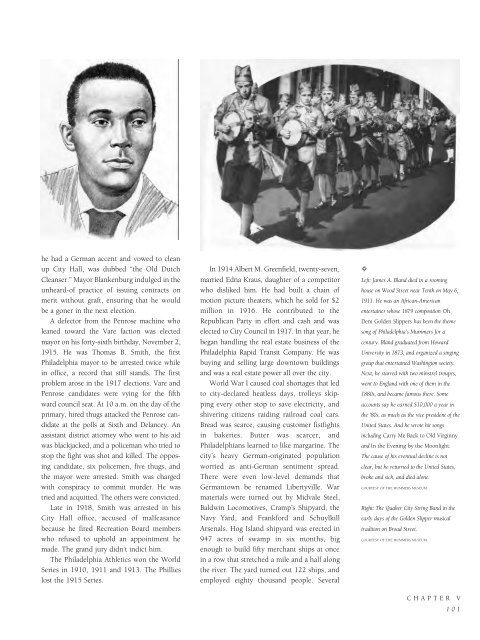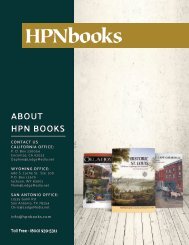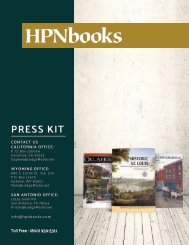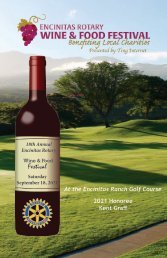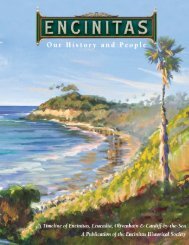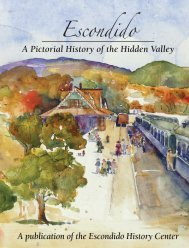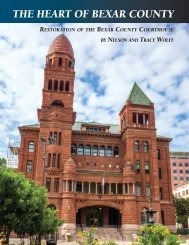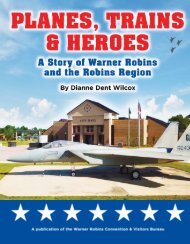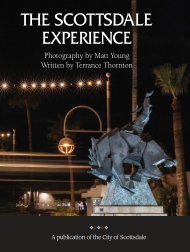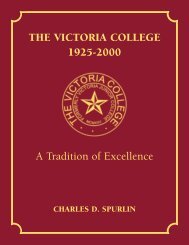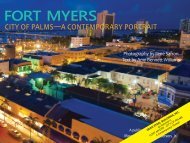Historic Philadelphia
An illustrated history of the city of Philadelphia, paired with the histories of companies, families and organizations that make the region great.
An illustrated history of the city of Philadelphia, paired with the histories of companies, families and organizations that make the region great.
You also want an ePaper? Increase the reach of your titles
YUMPU automatically turns print PDFs into web optimized ePapers that Google loves.
he had a German accent and vowed to clean<br />
up City Hall, was dubbed “the Old Dutch<br />
Cleanser.” Mayor Blankenburg indulged in the<br />
unheard-of practice of issuing contracts on<br />
merit without graft, ensuring that he would<br />
be a goner in the next election.<br />
A defector from the Penrose machine who<br />
leaned toward the Vare faction was elected<br />
mayor on his forty-sixth birthday, November 2,<br />
1915. He was Thomas B. Smith, the first<br />
<strong>Philadelphia</strong> mayor to be arrested twice while<br />
in office, a record that still stands. The first<br />
problem arose in the 1917 elections. Vare and<br />
Penrose candidates were vying for the fifth<br />
ward council seat. At 10 a.m. on the day of the<br />
primary, hired thugs attacked the Penrose candidate<br />
at the polls at Sixth and Delancey. An<br />
assistant district attorney who went to his aid<br />
was blackjacked, and a policeman who tried to<br />
stop the fight was shot and killed. The opposing<br />
candidate, six policemen, five thugs, and<br />
the mayor were arrested. Smith was charged<br />
with conspiracy to commit murder. He was<br />
tried and acquitted. The others were convicted.<br />
Late in 1918, Smith was arrested in his<br />
City Hall office, accused of malfeasance<br />
because he fired Recreation Board members<br />
who refused to uphold an appointment he<br />
made. The grand jury didn’t indict him.<br />
The <strong>Philadelphia</strong> Athletics won the World<br />
Series in 1910, 1911 and 1913. The Phillies<br />
lost the 1915 Series.<br />
In 1914 Albert M. Greenfield, twenty-seven,<br />
married Edna Kraus, daughter of a competitor<br />
who disliked him. He had built a chain of<br />
motion picture theaters, which he sold for $2<br />
million in 1916. He contributed to the<br />
Republican Party in effort and cash and was<br />
elected to City Council in 1917. In that year, he<br />
began handling the real estate business of the<br />
<strong>Philadelphia</strong> Rapid Transit Company. He was<br />
buying and selling large downtown buildings<br />
and was a real estate power all over the city.<br />
World War I caused coal shortages that led<br />
to city-declared heatless days, trolleys skipping<br />
every other stop to save electricity, and<br />
shivering citizens raiding railroad coal cars.<br />
Bread was scarce, causing customer fistfights<br />
in bakeries. Butter was scarcer, and<br />
<strong>Philadelphia</strong>ns learned to like margarine. The<br />
city’s heavy German-originated population<br />
worried as anti-German sentiment spread.<br />
There were even low-level demands that<br />
Germantown be renamed Libertyville. War<br />
materials were turned out by Midvale Steel,<br />
Baldwin Locomotives, Cramp’s Shipyard, the<br />
Navy Yard, and Frankford and Schuylkill<br />
Arsenals. Hog Island shipyard was erected in<br />
947 acres of swamp in six months, big<br />
enough to build fifty merchant ships at once<br />
in a row that stretched a mile and a half along<br />
the river. The yard turned out 122 ships, and<br />
employed eighty thousand people. Several<br />
✧<br />
Left: James A. Bland died in a rooming<br />
house on Wood Street near Tenth on May 6,<br />
1911. He was an African-American<br />
entertainer whose 1879 composition Oh,<br />
Dem Golden Slippers has been the theme<br />
song of <strong>Philadelphia</strong>’s Mummers for a<br />
century. Bland graduated from Howard<br />
University in 1873, and organized a singing<br />
group that entertained Washington society.<br />
Next, he starred with two minstrel troupes,<br />
went to England with one of them in the<br />
1880s, and became famous there. Some<br />
accounts say he earned $10,000 a year in<br />
the ’80s, as much as the vice president of the<br />
United States. And he wrote hit songs<br />
including Carry Me Back to Old Virginny<br />
and In the Evening by the Moonlight.<br />
The cause of his eventual decline is not<br />
clear, but he returned to the United States,<br />
broke and sick, and died alone.<br />
COURTESY OF THE MUMMERS MUSEUM.<br />
Right: The Quaker City String Band in the<br />
early days of the Golden Slipper musical<br />
tradition on Broad Street.<br />
COURTESY OF THE MUMMERS MUSEUM.<br />
CHAPTER V<br />
101


